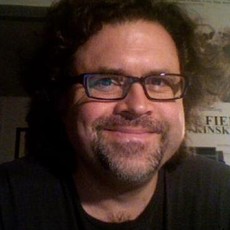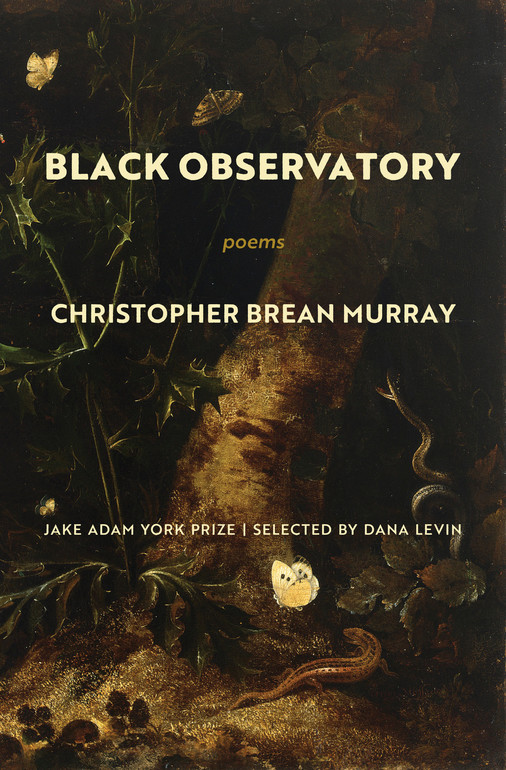You can think while walking, running,washing the dishes, reading, grocery shopping,or sleeping. Driving across Nevada at nightbreeds thoughts. They leap from sagebrushlike jackrabbits into your high beams.Most people can’t think while writing.They have ideas, yes, but not thoughts.Anyone can snatch an old idea out of the dustand show it around. Trying to thinkwill invariably prohibit thought. I thoughtof writing this poem while driving to workthis morning. I made sure not to think about itmuch. The wind swayed a stoplightuntil it turned green. A man in a tank topleaned into the window of a parked car.It was not yet 8 a.m. Wisps of cloudcoursed through the sky over Houston.Someone should compile a bookcalled A History of Clouds. It could be,among other things, an anthologyof descriptions of clouds, from novels,from the love letters of exiled princes.Shakespeare’s “pestilent congregationof vapors” speech would appear, as wouldMayakovsky’s “The Cloud in Trousers.”Clouds aren’t mentioned much in the Bible.God did, however, call to Moses from insidea cloud. Enoch speaks of “the locked reservoirsfrom which the winds are distributed.”Crane’s “To the Cloud Juggler” andStevens “Sea Surface Full of Clouds”—and that passage from Gogolwhere a cloud slithers over Nevsky Prospect.It stretches and coils and becomes an intestineembracing the anxious protagonistuntil we realize he’s being suffocated by his thoughts.Somewhere Rilke speaks of “vast, ruinedkingdoms of cloud.” That from the love letterof another exiled prince.
A History of Clouds
Feature Date
- March 30, 2023
Series
- Editor's Choice
Selected By
- Dana Levin
Share This Poem
Print This Poem
“A History of Clouds” from BLACK OBSERVATORY: by Christopher Brean Murray.
Published by Milkweed Editions on February 14, 2023.
Copyright © 2023 by Christopher Brean Murray.
All rights reserved.
Reproduced by Poetry Daily with permission.

Christopher Brean Murray’s book, Black Observatory, was chosen by Dana Levin as the winner of the 2021-2022 Jake Adam York Prize. It was recently published by Milkweed Editions. His poems have appeared or are forthcoming in American Poetry Review, Colorado Review, Quarterly West, and other journals. He lives in Houston.
“In this playful and haunting debut, Murray turns his gaze toward the ordinariness and expansiveness of human life…The observational and sympathetic power of these searching poems makes them hard to forget.”
—Publishers Weekly, starred review
“With these fantastical scenes, streams-of-consciousness, and absurdist associations, these poems encourage readers to process the complexity of emotion, experience, and the human condition. [Black Observatory showcases] Murray’s ability to seamlessly move into worlds where readers may find themselves unable to unravel the real from the imagined.”
—The West Review
“Just as myths work to explain why things work the way they do, Murray’s numinous work shows us that poems offer us the same power: a path to follow that becomes a cosmological roadmap for any to investigate the mysteries of human traditions, cultural traits, and religious or supernatural beliefs. Black Observatory is a tremendous reflection of the world and of us, in all our complexity.”
—Mikal Wix, West Trade Review
“Its very strangeness, its eccentric lenses on cis masculinity, and its simple, formal elegance called me to Black Observatory. Reading these poems is like embarking on a Twilight Zone episode where Franz Kafka bumps into Salvador Dalí in a hardware store, and dark, absurdist adventures ensue; where ‘Crimes of the Future’ involve ‘Quitting a job everyone agrees you should keep’ and ‘Kissing a foreigner in a time of war.’ There’s sweetness here, too, and deep thought and feeling―this is a singular debut by a singular sensibility: no one else sounds like Murray.”
—Dana Levin
Poetry Daily Depends on You
With your support, we make reading the best contemporary poetry a treasured daily experience. Consider a contribution today.




